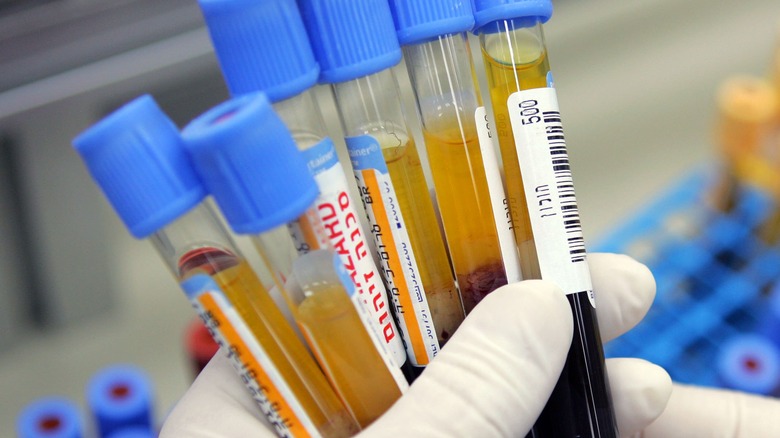How Long Should You Fast Before Having Blood Work?
Having blood work done is a normal procedure that everyone goes through at some point in their lives. Often done as part of a regular check-up, a health care provider will collect a sample of your blood by poking a small needle into a vein and drawing the blood into a tube or vial, according to MedlinePlus. This is called venipuncture and is the most common way for a doctor to collect blood.
A blood test is a completely safe and common procedure that allows your healthcare provider to learn many things about your health, including how well your organs are functioning. They can also diagnose diseases, check your immune system, and much more, explains Johns Hopkins Medicine. Most labs do not require fasting, but some may have you not eat food before the test, as food can affect the results, according to Verywell Health. Why do some labs require fasting and how long should you fast before a blood test?
Fast for 8-12 hours before a blood test
While the exact number can vary depending on the lab and doctor administering the test, the most common length of time to fast before blood work is 8-12 hours, according to WebMD. This not only includes solid food, but also smoking, chewing gum, and even exercising. All of these things can affect your results. Water is okay to consume and may even be encouraged by your doctor. However, always take your prescription medications before blood work unless specifically told not to by your doctor, explains Verywell Health.
If the thought of fasting for 12 hours sounds horrible, don't worry. One easy way to complete the fast before blood work is to schedule your appointment in the morning (via WebMD). This way, after you finish dinner the night before, you can go to bed and fast and sleep at the same time. Once morning arrives, you just have to survive without food until after the appointment.
Fasting can affect your blood work results
Fasting is often required because the nutrients from food and drinks can alter the results of your blood work. Nutrients from food enter your bloodstream after you eat, changing how the results of your blood test are interpreted by the doctor, according to WebMD. For example, eating a cookie before a blood test could spike your blood sugar, leading the health care provider to believe that your baseline blood sugar level is too high. Fasting allows the doctor to see your baseline results and provide more accurate recommendations.
If you slip up and eat or drink something before your blood work, don't worry — simply tell your doctor what you ate so they can better interpret your blood test, explains Verywell Health. Be aware that it's possible that your doctor may reschedule the test depending on what you ate and what they are testing for.



